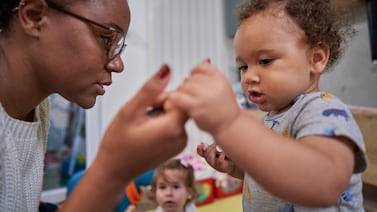In a push to expand early education several years ago, Indiana tacked on an extra $1 million for an unconventional idea: online preschool lessons.
Despite skepticism from early childhood advocates, lawmakers hoped the innovative strategy would provide an extra option for families and fill critical gaps in preschool access. But as the small program called Waterford Upstart starts its third year in Indiana, it has served far fewer children than intended, raising questions from a key lawmaker about whether the public investment is worthwhile.
“If we’re appropriating money for it, and nobody’s aware of it, then how are they going to use it?” said Indiana House education leader Bob Behning, R-Indianapolis. “And without having some usage of it, it’s hard to assess the efficacy.”
In 2018-19, Upstart’s first year, the program enrolled 192 children — only 55% of its annual goal. The following year, Upstart signed up only 31% of its goal.
The pandemic, which is affecting early education enrollment across the country, has depressed participation even further: Near the end of last month, Upstart had only identified about 60 children for the online program, 17% of its goal.
Now, Indiana is asking Upstart to make its case for whether the program can work here — and whether children are seeing academic benefits.
Upstart Executive Director and Co-founder Claudia Miner said the challenge lies in reaching a very limited pool: 4-year-olds from low-income families who don’t have access to state-funded pre-K.
She contended that for those children it served, Upstart has had a positive effect. An external evaluation of Hoosier children in the first year of Upstart showed significantly improved literacy skills. The program did not, however, have a noteworthy effect on math or social skills.
“It’s a worthy tool in the tool shed,” Miner said.
Not a substitute for preschool
Miner is quick to say that she doesn’t believe Upstart is a substitute for preschool. In fact, she doesn’t consider it to be preschool at all. She calls Upstart an at-home “kindergarten readiness” program.
Having 4-year-olds spend 30 minutes a day, five days a week learning through a laptop isn’t the same as a high-quality classroom experience, Miner said.
“Our intent has never been to replace anything that’s already happening in Indiana,” Miner said. “Our intent is always to fill gaps. And I think there are gaps in Indiana.”
She pointed to families who don’t live near quality preschools, who can’t drive their children to and from preschool every day, who work off-shifts, or who want to keep their young children at home.
Indiana uses Upstart to complement On My Way Pre-K, the state’s free program for low-income families. Upstart serves qualifying families who aren’t signed up for On My Way Pre-K — reaching children who probably wouldn’t otherwise be in quality early learning settings, Miner said.
Upstart provides a free computer and free internet access, and encourages children to spend 15 minutes on reading and another 15 minutes on math each day. Through interactive lessons, children learn skills such as letter recognition and counting. The program repeats concepts until children master them, then advances to harder questions.
Local early educators also coach families on supporting their child’s learning offline and gather families for group activities to help with social development — a piece that has moved online during the pandemic.
But as a newer program, Upstart has struggled to get its name in front of parents. Since it’s reaching so few families, word is slow to get around.
As a private Utah-based nonprofit, Waterford can’t see who’s eligible for government services in order to recruit those families. Instead, Upstart has a few people on the ground in Indiana and central staff who advertise Upstart through groups that support low-income families, such as food banks and libraries.
Even though more families are turning to remote learning this year, the pandemic has also limited Waterford’s ability to recruit in person.
Early childhood education in general in Indiana has been slow to take off. It took several years for the state to fill seats in On My Way Pre-K, even though advocates on both sides of the aisle say a pressing need exists.
For Tiffani O’Hair, a parent in Fillmore, Indiana, online preschool lessons better fulfilled her family’s needs than would an in-person preschool. She works 10-hour shifts at a Walmart distribution center, so she wouldn’t be able to drive her daughter to preschool during the day.
She also worried about shouldering the cost of preschool as a single parent.
“We could not afford to send her to preschool this year, so I looked into Waterford and read a bunch of good reviews,” she said.
Her 4-year-old is still learning to read on her own but loves being read to, pretending to read to her mom, and making up stories. O’Hair hopes Upstart will teach her how to use technology in preparation for when she starts kindergarten and supplement the social interaction her daughter gets at day care.
“That’s why I didn’t feel too bad about having her do the online preschool,” O’Hair said. “I do think the in-person would be better, but I think with this program it’s more one-on-one.”
A critical look ahead
Upstart costs the state just a fraction of the budgeted $1 million. In a typical year, such a tiny expense might not draw much scrutiny, especially since early childhood education has become a priority and enjoys bipartisan support.
In the upcoming legislative session, lawmakers are due to evaluate their recent investments in early childhood education and will likely face budget cuts because of the pandemic’s economic downturn.
Behning, the House education head and a staunch supporter of school choice, said he wants to see more data on how well Upstart prepares children from low-income backgrounds and hear how the program would increase sign-ups and use.
“It’s hard to make an informed decision because there’s just not enough data,” he said.
Upstart could provide a good option for families hoping to reduce risk of coronavirus exposure, he said. But he also raised a concern about Upstart’s ability to help children develop social skills.
Senate education leader Jeff Raatz, R-Centerville, declined to comment.
Miner argues that the state could loosen restrictions on Upstart to increase participation — such as allowing it to recruit outside of rural counties — and help Upstart find families.
“If the state worked with us, I think it would be better, because we are serving children that they’re not reaching,” she said. “So the question is, where are those kids?”
Miner also wants the state to lift the requirement that its on-the-ground coaches be licensed early education providers, saying it narrows their hiring pool.
Other challenges and benefits
Miner maintains that the first-year evaluation and Upstart’s track record in other states show clear benefits, particularly with reading skills.
Not everyone, however, is convinced. Some early childhood education advocates question relying on online learning at such a young age, when critical lessons include play, socializing, and problem-solving.
Susan Adamson, associate professor of education at Butler University, said online learning can be more complicated than it sounds — and some children may not have the necessary support at home.
“What I worry about is that when people conceptualize online learning, they first of all think it’s completely automated,” she said. “There has to be a person there. There really has to be a teacher there.”
Upstart’s results in Indiana so far show that academic gains are closely tied to usage — the more consistently children use Upstart, the better their growth.
The challenge is that only about half of students completed Upstart in the first year, according to the external evaluation.
Still, one school district has seen clear benefits from Upstart. In 2017, before contracting with the state, Waterford piloted Upstart in New Albany-Floyd County Schools. The southern Indiana district, which uses Waterford programs as an extra support for struggling early elementary students, helped Upstart find preschool-age children.
Nearly all of the Upstart participants ended up at or above where they should be academically, said Barb Hoover, the district literacy coach. For a couple of students later diagnosed with special education needs, Upstart provided a critical intervention.
Students who saw the biggest gains also attended an in-person preschool.
“The two of them together is best-case scenario,” Hoover said. “But if you can’t have preschool, this absolutely fits the bill. This absolutely helps.”






